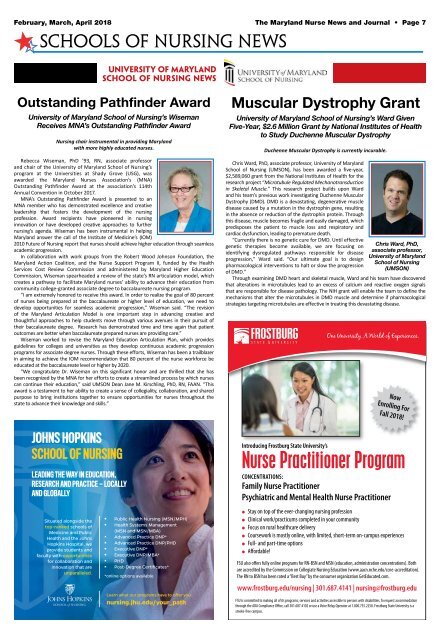The Maryland Nurse – February 2018
You also want an ePaper? Increase the reach of your titles
YUMPU automatically turns print PDFs into web optimized ePapers that Google loves.
<strong>February</strong>, March, April <strong>2018</strong> <strong>The</strong> <strong>Maryland</strong> <strong>Nurse</strong> News and Journal • Page 7<br />
Schools of Nursing News<br />
University of <strong>Maryland</strong><br />
School of Nursing News<br />
Outstanding Pathfinder Award<br />
University of <strong>Maryland</strong> School of Nursing’s Wiseman<br />
Receives MNA’s Outstanding Pathfinder Award<br />
Nursing chair instrumental in providing <strong>Maryland</strong><br />
with more highly educated nurses.<br />
Rebecca Wiseman, PhD ’93, RN, associate professor<br />
and chair of the University of <strong>Maryland</strong> School of Nursing’s<br />
program at the Universities at Shady Grove (USG), was<br />
awarded the <strong>Maryland</strong> <strong>Nurse</strong>s Association’s (MNA)<br />
Outstanding Pathfinder Award at the association’s 114th<br />
Annual Convention in October 2017.<br />
MNA’s Outstanding Pathfinder Award is presented to an<br />
MNA member who has demonstrated excellence and creative<br />
leadership that fosters the development of the nursing<br />
profession. Award recipients have pioneered in nursing<br />
innovation or have developed creative approaches to further<br />
nursing’s agenda. Wiseman has been instrumental in helping<br />
<strong>Maryland</strong> answer the call of the Institute of Medicine’s (IOM)<br />
2010 Future of Nursing report that nurses should achieve higher education through seamless<br />
academic progression.<br />
In collaboration with work groups from the Robert Wood Johnson Foundation, the<br />
<strong>Maryland</strong> Action Coalition, and the <strong>Nurse</strong> Support Program II, funded by the Health<br />
Services Cost Review Commission and administered by <strong>Maryland</strong> Higher Education<br />
Commission, Wiseman spearheaded a review of the state’s RN articulation model, which<br />
creates a pathway to facilitate <strong>Maryland</strong> nurses’ ability to advance their education from<br />
community college-granted associate degree to baccalaureate nursing program.<br />
“I am extremely honored to receive this award. In order to realize the goal of 80 percent<br />
of nurses being prepared at the baccalaureate or higher level of education, we need to<br />
develop opportunities for seamless academic progression,” Wiseman said. “<strong>The</strong> revision<br />
of the <strong>Maryland</strong> Articulation Model is one important step in advancing creative and<br />
thoughtful approaches to help students move through various avenues in their pursuit of<br />
their baccalaureate degree. Research has demonstrated time and time again that patient<br />
outcomes are better when baccalaureate prepared nurses are providing care.”<br />
Wiseman worked to revise the <strong>Maryland</strong> Education Articulation Plan, which provides<br />
guidelines for colleges and universities as they develop continuous academic progression<br />
programs for associate degree nurses. Through these efforts, Wiseman has been a trailblazer<br />
in aiming to achieve the IOM recommendation that 80 percent of the nurse workforce be<br />
educated at the baccalaureate level or higher by 2020.<br />
“We congratulate Dr. Wiseman on this significant honor and are thrilled that she has<br />
been recognized by the MNA for her efforts to create a streamlined process by which nurses<br />
can continue their education,” said UMSON Dean Jane M. Kirschling, PhD, RN, FAAN. “This<br />
award is a testament to her ability to create a sense of collegiality, collaboration, and shared<br />
purpose to bring institutions together to ensure opportunities for nurses throughout the<br />
state to advance their knowledge and skills.”<br />
Muscular Dystrophy Grant<br />
University of <strong>Maryland</strong> School of Nursing’s Ward Given<br />
Five-Year, $2.6 Million Grant by National Institutes of Health<br />
to Study Duchenne Muscular Dystrophy<br />
Duchenne Muscular Dystrophy is currently incurable.<br />
Chris Ward, PhD, associate professor, University of <strong>Maryland</strong><br />
School of Nursing (UMSON), has been awarded a five-year,<br />
$2,589,060 grant from the National Institutes of Health for the<br />
research project “Microtubule Regulated Mechanotransduction<br />
in Skeletal Muscle.” This research project builds upon Ward<br />
and his team’s previous work investigating Duchenne Muscular<br />
Dystrophy (DMD). DMD is a devastating, degenerative muscle<br />
disease caused by a mutation in the dystrophin gene, resulting<br />
in the absence or reduction of the dystrophin protein. Through<br />
this disease, muscle becomes fragile and easily damaged, which<br />
predisposes the patient to muscle loss and respiratory and<br />
cardiac dysfunction, leading to premature death.<br />
“Currently there is no genetic cure for DMD. Until effective<br />
genetic therapies become available, we are focusing on<br />
identifying dysregulated pathways responsible for disease<br />
progression,” Ward said. “Our ultimate goal is to design<br />
pharmacological interventions to halt or slow the progression<br />
of DMD.”<br />
Chris Ward, PhD,<br />
associate professor,<br />
University of <strong>Maryland</strong><br />
School of Nursing<br />
(UMSON)<br />
Through examining DMD heart and skeletal muscle, Ward and his team have discovered<br />
that alterations in microtubules lead to an excess of calcium and reactive oxygen signals<br />
that are responsible for disease pathology. <strong>The</strong> NIH grant will enable the team to define the<br />
mechanisms that alter the microtubules in DMD muscle and determine if pharmacological<br />
strategies targeting microtubules are effective in treating this devastating disease.

















